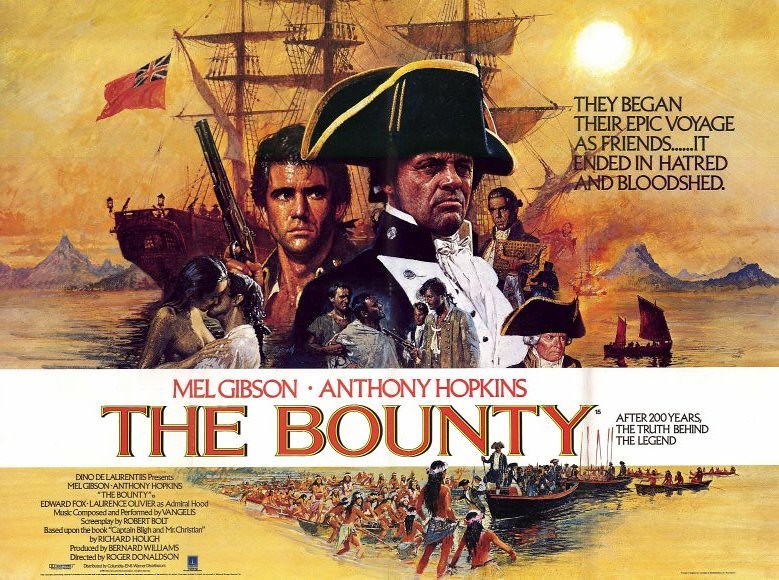- Joined
- Dec 12, 2009
- Messages
- 32,717
- Reaction score
- 11,203
NOTE to NON-MEMBERS: Interested in joining the SHERDOG MOVIE CLUB? Shoot me a PM for more info!
Here's a quick list of all movies watched by the SMC. Or if you prefer, here's a more detailed examination.

Our Director
Roger Donaldson

Roger Donaldson was born on November 15, 1945 in Ballarat, Australia. He is a director and producer, known for The World's Fastest Indian (2005), Species (1995) and Cocktail (1988). He is married to Marliese Schneider. He was previously married to Susan Hockley.
* This movie is generally regarded as the most accurate depiction of the actual mutiny.
* The re-creation of the "Bounty" specially built for the movie had, for many years, been used as a tourist cruise ship at Darling Harbour, Sydney, Australia, until 2007 when it was sold to HKR International Limited. The ship is now on Lantau Island in Discovery Bay, Hong Kong, and continues to function as a tourist cruise charter.
* Captain William Bligh's later career was peppered with further mutinies and complaints about his "oppressive attitude". His tyrannical nature later sparked the Rum Rebellion in New South Wales in 1808, which led to his being forcibly deported.
* Sir Anthony Hopkins, who had battled with alcoholism until becoming abstinent in 1975, was worried about Mel Gibson's heavy drinking, saying, "Mel is a wonderful, wonderful fellow with a marvelous future. He's already something of a superstar, but he's in danger of blowing it, unless he takes hold of himself." Gibson, who likewise self-identified as an alcoholic, agreed with this concern, and added his admiration for the Welsh actor: "He was terrific. He was good to work with, because he was open, and he was willing to give. He's a moral man, and you could see this. I think we had the same attitudes."
* Mel Gibson has expressed a belief that this movie's revisionism did not go far enough, believing that his character should have been portrayed as the antagonist. He praised Sir Anthony Hopkins' performance, as Lieutenant William Bligh, as the best aspect of the movie.
Members: @europe1 @MusterX @Scott Parker 27 @Cubo de Sangre @sickc0d3r @FrontNakedChoke @AndersonsFoot @Tufts @chickenluver @Coolthulu @OMGstreetfight @Yotsuya @jei @LHWBelt @moreorless87 @ArtemV @Bullitt68 @HenryFlower @Nailgun @Rimbaud82 @BeardotheWeirdo @Zer
Here's a quick list of all movies watched by the SMC. Or if you prefer, here's a more detailed examination.

Our Director
Roger Donaldson

Our Stars
Mely Gibson

Anthony Hopkins

Premise: Fed up with their captain's harsh discipline, a sailing ship's crew decides to take action.
Budget: $20 million
Box Office: $18.3 million
Trivia
(Courtesy of the IMDB)
Mely Gibson

Anthony Hopkins

Premise: Fed up with their captain's harsh discipline, a sailing ship's crew decides to take action.
Budget: $20 million
Box Office: $18.3 million
Trivia
(Courtesy of the IMDB)
* This movie is generally regarded as the most accurate depiction of the actual mutiny.
* The re-creation of the "Bounty" specially built for the movie had, for many years, been used as a tourist cruise ship at Darling Harbour, Sydney, Australia, until 2007 when it was sold to HKR International Limited. The ship is now on Lantau Island in Discovery Bay, Hong Kong, and continues to function as a tourist cruise charter.
* Captain William Bligh's later career was peppered with further mutinies and complaints about his "oppressive attitude". His tyrannical nature later sparked the Rum Rebellion in New South Wales in 1808, which led to his being forcibly deported.
* Sir Anthony Hopkins, who had battled with alcoholism until becoming abstinent in 1975, was worried about Mel Gibson's heavy drinking, saying, "Mel is a wonderful, wonderful fellow with a marvelous future. He's already something of a superstar, but he's in danger of blowing it, unless he takes hold of himself." Gibson, who likewise self-identified as an alcoholic, agreed with this concern, and added his admiration for the Welsh actor: "He was terrific. He was good to work with, because he was open, and he was willing to give. He's a moral man, and you could see this. I think we had the same attitudes."
* Mel Gibson has expressed a belief that this movie's revisionism did not go far enough, believing that his character should have been portrayed as the antagonist. He praised Sir Anthony Hopkins' performance, as Lieutenant William Bligh, as the best aspect of the movie.
Members: @europe1 @MusterX @Scott Parker 27 @Cubo de Sangre @sickc0d3r @FrontNakedChoke @AndersonsFoot @Tufts @chickenluver @Coolthulu @OMGstreetfight @Yotsuya @jei @LHWBelt @moreorless87 @ArtemV @Bullitt68 @HenryFlower @Nailgun @Rimbaud82 @BeardotheWeirdo @Zer






 (side-note) It was really hard to find a non-nude photo of the women from this movie.
(side-note) It was really hard to find a non-nude photo of the women from this movie.





